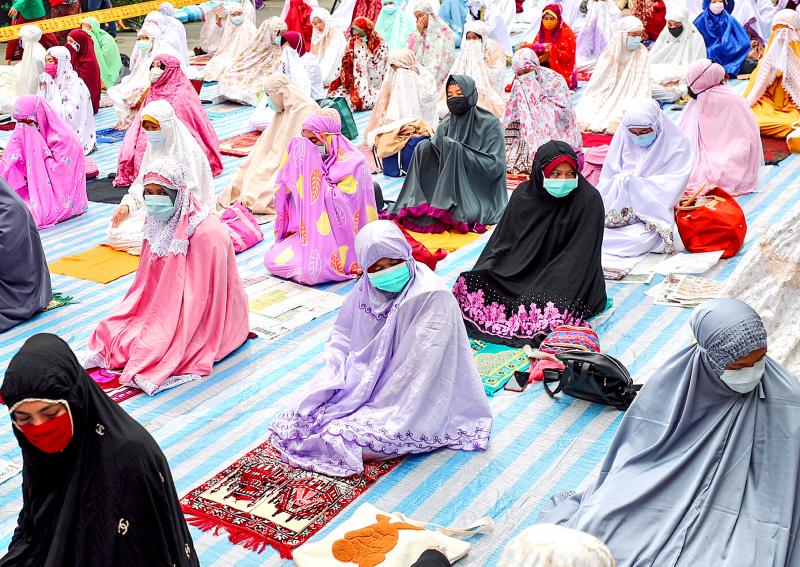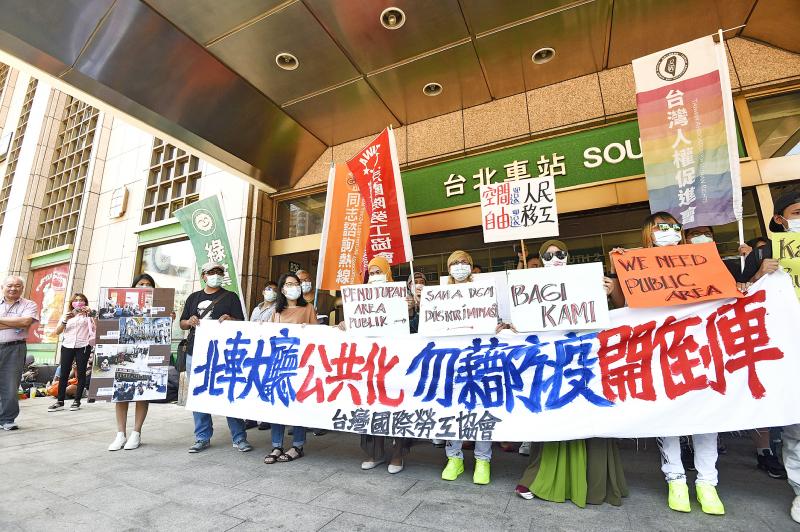The Taiwan Railways Administration (TRA) should not use the government’s disease-prevention policy as an excuse to block people’s access to the Taipei Railway Station’s main hall, the Taiwan International Workers’ Association said yesterday.
The association held a protest at the station after what organizers said were about 400 people staged a sit-in on Saturday to demonstrate against the TRA’s proposal to ban sitting on the floor of the main hall.
In accordance with the Central Epidemic Command Center’s disease-prevention measures, large gatherings have been banned in the hall since the end of February.

Photo: CNA
After protesters yesterday expressed their grievances at the southern entrance to the station, they marched toward the center of the main hall and sat down, saying they dared police to drag them away.
Station Master Huang Jung-hua (黃榮華) said that the protesters would not be fined, as they were simply expressing their opinions.
“We will include the group next week when we discuss how the public space should be used,” Huang said.

Photo: George Tsorng, Taipei Times
The railway agency distributed bottled water to people at the railway station, most of whom sat around the pillars in the main hall.
The Ministry of Transportation and Communications and the TRA last week said that the main hall would be open to the public after the COVID-19 outbreak is brought under control, although they would set rules on how the main hall should be properly used.
Until then, the hall would remain closed to public events, including yesterday’s Eid al-Fitr celebrations, they said.
Association representative Chen Hsiu-lien (陳秀蓮) said that the issues of where migrant workers should go to celebrate Eid al-Fitr and whether migrant workers could gather at Taipei Railway Station for such an event are covered by the media whenever the Muslim festival approaches.
Rather than focusing on whether migrant workers should be allowed to sit in the main hall on holidays or during Eid al-Fitr, Chen said that the public should focus on how the railway agency has exploited a public space for monetary gain.
After the agency outsourced management of the station mainly to the Breeze Center, government agencies or non-profit organizations would need to pay NT$40,000 to NT$120,000 to host events in the main hall, whereas private organizations or schools would have to pay NT$60,000 to NT$500,000, she said.
“The agency has been telling people that the main hall was not designed for people to sit on the floor. What it did not say was that people can do so, they will only have to pay for it,” she said.
An Indonesian migrant worker named Wiwin said that many migrant workers are carers whose salaries did not meet the minimum wage.
It is impossible for migrant workers to regularly frequent restaurants on the second floor of the station so that they can have a place to sit, she said.
“Most of us have less than a day to ourselves and can only meet at large transport hubs. As such, the main hall at the Taipei Railway Station is an important place for us,” she said.
“Citizens of this country need a place to sit as well, but why do people always use migrant workers as a reason when they enforce a policy? Why would our sitting in the main hall impede the foot traffic inside the train station, but a large event at the main hall would not?” she asked.
Yang You-ren (楊友仁), a sociology professor at Tunghai University, said that the main hall is one of the rare places in the nation where people can freely exchange their ideas and observations.
Imposing a sitting ban would be like bringing back martial law, Yang said, adding that the government should maintain social diversity by encouraging people to communicate in public spaces.

Beijing could eventually see a full amphibious invasion of Taiwan as the only "prudent" way to bring about unification, the US Department of Defense said in a newly released annual report to Congress. The Pentagon's "Annual Report to Congress: Military and Security Developments Involving the People's Republic of China 2025," was in many ways similar to last year’s report but reorganized the analysis of the options China has to take over Taiwan. Generally, according to the report, Chinese leaders view the People's Liberation Army's (PLA) capabilities for a Taiwan campaign as improving, but they remain uncertain about its readiness to successfully seize

Taiwan is getting a day off on Christmas for the first time in 25 years. The change comes after opposition parties passed a law earlier this year to add or restore five public holidays, including Constitution Day, which falls on today, Dec. 25. The day marks the 1947 adoption of the constitution of the Republic of China, as the government in Taipei is formally known. Back then the Chinese Nationalist Party (KMT) governed China from Nanjing. When the KMT, now an opposition party in Taiwan, passed the legislation on holidays, it said that they would help “commemorate the history of national development.” That

Taiwan has overtaken South Korea this year in per capita income for the first time in 23 years, IMF data showed. Per capita income is a nation’s GDP divided by the total population, used to compare average wealth levels across countries. Taiwan also beat Japan this year on per capita income, after surpassing it for the first time last year, US magazine Newsweek reported yesterday. Across Asia, Taiwan ranked fourth for per capita income at US$37,827 this year due to sustained economic growth, the report said. In the top three spots were Singapore, Macau and Hong Kong, it said. South

Snow fell on Yushan (Jade Mountain, 玉山) yesterday morning as a continental cold air mass sent temperatures below freezing on Taiwan’s tallest peak, the Central Weather Administration (CWA) said. Snowflakes were seen on Yushan’s north peak from 6:28am to 6:38am, but they did not fully cover the ground and no accumulation was recorded, the CWA said. As of 7:42am, the lowest temperature recorded across Taiwan was minus-5.5°C at Yushan’s Fengkou observatory and minus-4.7°C at the Yushan observatory, CWA data showed. On Hehuanshan (合歡山) in Nantou County, a low of 1.3°C was recorded at 6:39pm, when ice pellets fell at Songsyue Lodge (松雪樓), a